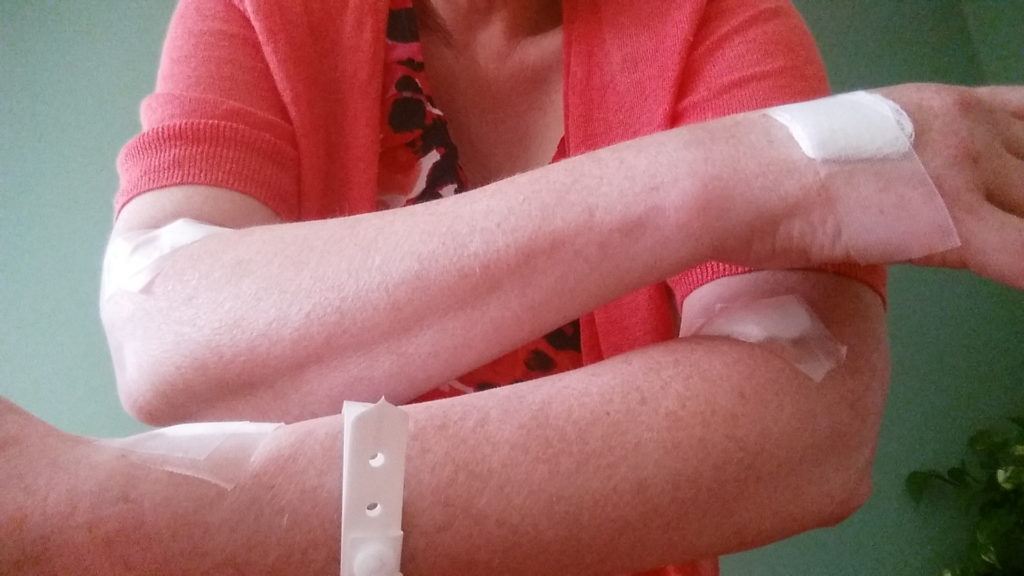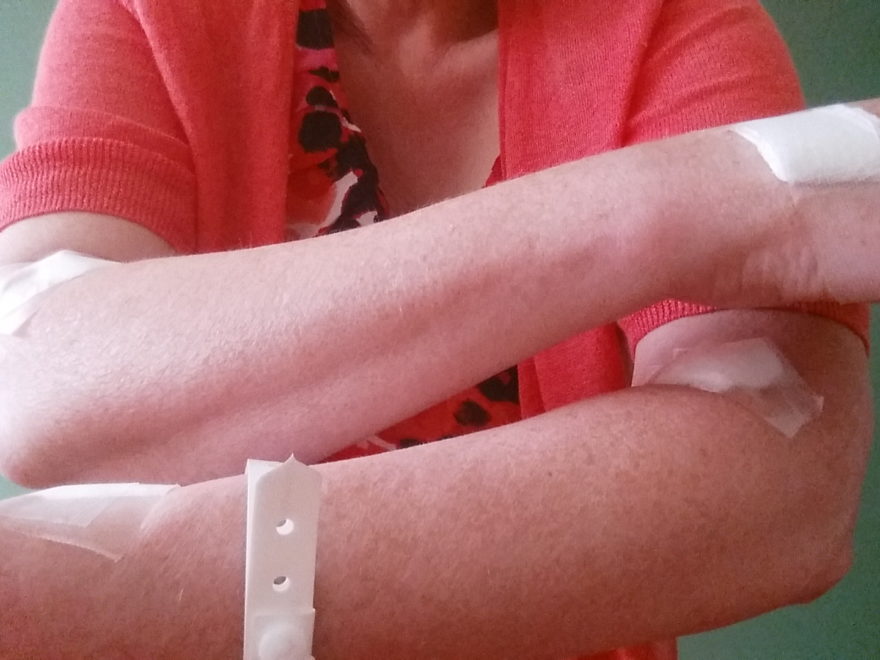No, this post isn’t about delivering a baby! It’s about what happened when the anaesthetic wore off from a nerve block. It was my first Bier block, also called an IV block, for Complex Regional Pain Syndrome (CRPS). You can read more about Bier blocks here.
To try to reduce the stiffness that had set in in all the finger joints of my right hand, as well as in my wrist, my neuro-anaesthesiologist and I decided to a different procedure last month. I had that same procedure again this month, this past Tuesday. This procedure was done in the hospital’s day-surgery operating room (OR).
Unlike the first 6 day-surgery procedures I had with my neuro-anaesthesiologist, the Bier blocks weren’t ultrasound-guided. For stellate ganglion (nerve) blocks, this specialist had to use the ultrasound to find his way within my body, to guide the long needle used for that type of block.
But this new block, the Bier block, was still interesting. It seemed like something out of a horror movie in some ways, because it gave me a zombie arm!
After each Bier block took effect, and my arm was almost completely frozen or numbed, a hospital physiotherapist would come into the day-surgery OR to try to force open the joints in my fingers and wrist.
The goal was for me to gain some mobility and range of motion in my finger and wrist joints – for me to be able to use my hand again, to whatever extent possible.
This physiotherapy treatment lasted about 45 minutes during the first Bier block, and about 20 minutes during the second one. There are a few reasons why the second treatment was so much shorter than the first; they’re called pain seizures!
It was a good thing that my neuro-anaesthesiologist had left orders for me to kept in an observation bay – in the day-surgery OR rather than in the post-op area – until the anaesthetic had completely worn off from my first Bier block (last month).
He hadn’t given me any long-acting pain medication before the procedure, because he wasn’t sure how far the physiotherapist would be able to force – or push – my affected joints. Also partially because he knows that I don’t like to take any unnecessary medications.
Apparently the physiotherapist was able to force these joints them further than expected, because when the anaesthetic from the nerve block started to wear off, my legs and lower body began to buck and shake while I was lying on the surgical bed.
I had no idea what was going on, and I was terrified. My lower body was literally bouncing around on the hospital bed, and I had no control at all over these movements. One of the nurses came rushing over to check my vital signs, and another paged my neuro-anaesthesiologist.

By the time he rushed into the operating room a moment later, that bucking and shaking had spread to my entire body. While he was giving instructions to the nurses around me, I heard another physician explain what was happening to one of the medical students; there are always a lot of medical students and other doctors around when I have day-surgery procedures, because CRPS is a rare condition.
He was telling the students that I was having pain seizures. I heard him say that pain seizures were dangerous, because they could sometimes lead to a stroke or other complications.
Because of my background in clinical/medical research ethics, I looked into this type of seizure a few days later; it turns out that they’re fairly rare.(1) I suppose I shouldn’t be surprised that I had a rare reaction, to a procedure to treat a rare disease!
How did my neuro-anaesthesiologist try to – very quickly! – get my pain seizures under control? He had a nurse administer Fentanyl as a “push” through my IV, while at the same time he was injecting Dilaudid sub-Q (subcutaneous) into my left arm.
While a nurse was taking the syringe (needle) out of his hand, to set it down on a tray, my doctor put his hand on one of my legs and started to stare at his watch. All the while, he was asking the nurses for status updates on my vital signs.
My body was still bouncing around on the gurney, and I was joking with one of the nurses that I should have entered a ‘bucking bronco’ competition. When I’m nervous I tend to make bad jokes, and by this time the OR nurses – and my neuro-anaesthesiologist – were used to my jokes.
This was my 7th day-surgery procedure with my neuro-anaesthesiologist, in less than a month. I was watching him carefully, to see whether he seemed worried; I knew that if he was worried, then I probably should be as well. I asked why he was checking his watch, and he told me that he was counting off seconds on his stopwatch.
As I was about to ask what he was timing, he called out to one of the nurses: “Push again on my count. 3. 2. 1. Push now!” The nurse again injected Fentanyl through my IV, while my doctor took his hand off my leg to inject another dose of sub-Q Dilaudid into my arm.
He again put his hand on my leg, and started to stare at his watch, while talking to the nurses. After those second doses, my seizures started to subside. As they did, he raised his eyes from his watch, and thanked the nurses who’d come to assist.
My doctor kept his hand on my leg, and told me that he was using his hand to check on the strength of the seizures. If they got worse, or changed in a specific way, he said he’d have to try another medication to stop them.
He warned me that I’d likely feel completely exhausted for at least the rest of the day, because of the seizures; that I shouldn’t drive, or be alone, because I could suddenly feel weak and fall. He told me that he’d extend my observation period in the post-op area by an hour, to be sure the seizures didn’t come back.
I’ve often said that I value kindness very highly in physicians and other professionals working in healthcare. Sometimes people will ask for me examples, so here’s one: My neuro-anaesthesiologist offered to text my husband – himself – to let him know that he’d have to come pick me up at the hospital (at least) an hour later than planned.
I very quickly found out, literally moments after my doctor left my bedside, that double doses of Fentanyl and Dilaudid – within 2 minutes – are likely to make a person feel very nauseated. It was a good thing that my neuro-anaesthesiologist had written orders for me stay in the post-op area for an extra hour, because I vomited the entire time I was there.
At one point I was so weak from the seizures that I couldn’t stay sitting up on the hospital bed, but every time I’d try to lean back I’d be sick again. One of the post-op nurses paged my neuro-anaesthesiologist, because she thought I was getting worse. When he rushed over to me – again! – I told him that I just felt sick as soon as I leaned back, even with the gurney in the sitting position.
He quickly MacGyver’d a solution. He took some rigid seat cushions off some visitors’ chairs, wrapped them in blankets, and wedged them between my back and the raised back of the hospital bed. Then he placed the regular pillows over the seat cushions. I could lay back to rest, and still be upright enough not to start vomiting again.
By the time I was finally cleared, to be released from the post-op recovery area, I was very glad that my doctor had written a note on my chart that my husband had to come to the recovery area to get me. I needed to lean on him to walk from the hospital to the car! I didn’t want to use a wheelchair, and it wasn’t required after the type of procedure I’d undergone.
Despite all this, my neuro-anaesthesiologist and I decided to go ahead with the second Bier block a few weeks later; the one I had this past Tuesday. I really want to regain as much use of my hand and arm as possible, and the first Bier block significantly improved my knuckles. We had high hopes for this second procedure, but the results were barely noticeable this time.
References:
(1) Seizures After Anesthesia. “Tahoe Doc”. HealDove. 2012. Web:
https://healdove.com/health-care-industry/Seizures-after-Anesthesia
(2) Mohr, B. Safety and effectiveness of intravenous regional anesthesia (Bier block) for outpatient management of forearm trauma. CJEM. Jul 2006;8(4):247-50. Web:
https://www.ncbi.nlm.nih.gov/pubmed/17324303

